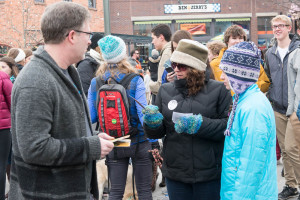Organizers of Colorado State University’s inaugural ACT Human Rights Film Festival kicked off their awareness-raising campaign for the April 15-22 event during the Martin Luther King Day March on Monday.
Festival volunteers, donning ACT (Awaken, Connect, Transform) T-shirts, handed out stickers and postcards promoting the film festival, which will feature at least 15 films about human rights from more than 10 countries. Some are being shown in Colorado for the first time.

Scholars, directors, producers, film subjects and advocates will be on hand after screenings at the Lory Student Center and Lyric Cinema Cafe to discuss their work and answer questions. There will also be representatives from nonprofit organizations and other resources available for those who want to lend assistance to the various causes represented.
‘Galvanizing stories’
“These are galvanizing stories that inspire you to get involved and help in some way,” says festival organizer Scott Diffrient, who holds the William E. Morgan Endowed Chair of Liberal Arts in CSU’s Department of Communication Studies. “For a brief period of time you feel like you know these individuals.”
“It’s important to have that opportunity available once you inspire people,” agrees Kyle Rasmussen, a graduate student in the Department of Journalism and Media Communication who is working on his own international human rights documentaries (see related story below.)
The films, all released since 2010, are organized under several themes, including “Disability Rights as Human Rights,” “For Democracy, Against Impunity,” “New Rainbow Nations: LGTBQ in Africa and Beyond,” “Stolen Children and Modern-Day Slavery” and “Hunger, Homelessness, Humanity.”
Art as resistance
Under the theme “Art as Resistance and Cultural Resilience,” Tomorrow We Disappear is about an arts community in New Delhi, India, that is being ousted by the government to make room for a skyscraper. The group harnesses its artistic talents to stage protests.

“I was swept away by the cathartic display of arts at the end of the film,” Diffrient says.
Director Partho Sen-Gupta will be the featured speaker after a screening of his narrative fiction film Sunrise, and political expert Peter Godwin of Zimbabwe will speak about corruption in his homeland following a showing of Democrats.
Also attending is Khadija Al-Salami, the director of I Am Nojooom, Age 10 and Divorced, based on an autobiographical account of a victim of sexual abuse in Yemen.
“Having her on hand to guide us through the rocky shoals of that film will be fantastic,” Diffrient says, noting that more than half of the movies in the festival were directed by women.
Rebelling in Iran
In addition, the screening of No Land’s Song, in which a group of Iranian female vocalists break the rules by staging an underground concert, will feature Director Ayat Najafi and his sister Sara Najafi, one of the subjects of the film.
Yi Seung-jun, director of Planet of Snail and Wind on the Moon, will host discussions after screenings of both films.
Another highlight will be an appearance by Pratap Rughani, the director of Justine, a story about a girl with a neurological disorder. Diffrient says it is a tale the director had to tell with careful consideration of how she’d want it to be told, given that she was unable to communicate.
He adds that his inspiration for organizing the first annual Act Human Rights Film Festival came from attending similar film festivals — and seeing the impact they had.
“Afterward, people didn’t feel despondent, they felt energized to do something,” Diffrient says. “It makes you realize that many people around the world are suffering in ways we can’t comprehend.”
Tickets will go on sale in March. For more information, visit actfilmfest.colostate.edu.
CSU grad student producing human rights films
A Colorado State University graduate student is working on two human-rights documentaries: one about the journey taken by refugees fleeing Syria and another centered on the treatment of widows in India.
The trailer for Rasmussen’s documentary about Indian widows, Without Color.
Kyle Rasmussen, who is working on his master’s degree in public communication and technology in the Department of Journalism and Media Communication, shot footage for the Syrian refugee documentary between Nov. 27 and Dec. 16, when he and his team visited Lebanon, Turkey, Greece, Macedonia, Serbia, Croatia, Slovenia, Austria and Germany.
CSU alumna Alexandra Ruiz led the project, and they were joined by J.J. Fountain. Rasmussen said he expects the film to be finished in May.
For the other documentary, Without Color, Rasmussen and fellow filmmakers spent about two months in India last summer to capture the plight of Indian widows — and the story of empowerment and hope that is emerging for them. Members of his team include CSU journalism graduates Sean Korbitz, Matt Wade and Brandon Yoder; current CSU students Will Baker, Mike Ball and Ben Ward; and Katie Gilliam and Sarah Bizzoco.
Rasmussen, founder and owner of the production company BlueShoe Media, expects to have a 30-minute version for phase one of the project done later this spring, and plans to return to India next summer for a second-phase film shoot.
The project has been funded completely by donors up to this point. Tax-deductible donations for Without Color can be made from the website for the film.
“His films seem to be completely in accord with what our film festival is all about,” said ACT Human Rights Film Festival Scott Diffrient, who holds the William E. Morgan Endowed Chair of Liberal Arts in CSU’s Department of Communication Studies. “It’s about putting faces on statistics and data. They make these stories human.”